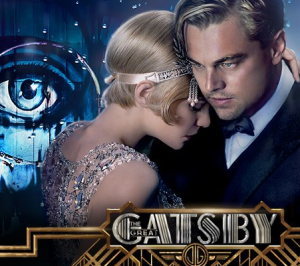 With F. Scott Fitzgerald’s The Great Gatsby back on the silver screen this week – all pimped out with a hard core soundtrack featuring Jay Z – it’s hard not to get swept up into the seductive excesses of 1920’s America…and think about how familiar it all seems (Real Housewives of Beverly Hills, anyone?) That decade of lavish lifestyles remains one of intrigue to those of us living nearly 100 years later, which is perhaps why reality TV shows like the Real Housewives are so popular today. We Americans are obsessed with money, along with peeking behind the curtain into the lives of those who have lots of it. No other American novel explores this theme better than The Great Gatsby.
With F. Scott Fitzgerald’s The Great Gatsby back on the silver screen this week – all pimped out with a hard core soundtrack featuring Jay Z – it’s hard not to get swept up into the seductive excesses of 1920’s America…and think about how familiar it all seems (Real Housewives of Beverly Hills, anyone?) That decade of lavish lifestyles remains one of intrigue to those of us living nearly 100 years later, which is perhaps why reality TV shows like the Real Housewives are so popular today. We Americans are obsessed with money, along with peeking behind the curtain into the lives of those who have lots of it. No other American novel explores this theme better than The Great Gatsby.
Familiar American Themes in The Great Gatsby
And no book with a money theme could be without an exploration of the values – good and bad – that accompany it. Fitzgerald’s novel could not exemplify any more profoundly the elements so often touted by personal development leaders such as Tony Robbins, Jim Rohn, John Maxwell, et. al. as necessary for manifesting money into your life: that hard work, perseverance, and the power of mindset will lead you down the road to success. Anyone who moves in the entrepreneurial space these days is all too aware of these kinds of messages plastered across millions of Facebook walls every single day. Work hard, stay positive and you, too, can have it all.
After all, the backbone of the American Dream is the steadfast belief that if you work hard enough and your “why” is big enough, you can achieve greatness and all its material rewards. A multi-billion dollar industry made up of guys like Rohn and Robbins has sprouted up around this belief system and continues to thrive. Jay Gatsby personifies the perfect student of the personal transformation business and what can happen when you set your mind to something, put the blinders on, and go at it full force with everything you’ve got. All the material trappings Gatsby owns – the mansion, the yacht, the cars, the clothes – mean only one thing to him: a way to attract back and then anchor forever the love of his life, Daisy Buchanan. Gatsby only wanted the wealth so he could win Daisy; none of it mattered a wit to him without her being a part of it with him. Indeed, he is so fixated on achieving this one goal that he loses site of reality, a moral warning Fitzgerald slips in through his narrator, Nick Carraway. And whether or not you agree with his reasons for doing what he did, you have to admit his internal drive is pretty admirable.
While having it all is held up in this culture as the holy grail of achievement, what having it all looks like is up for debate. Commercially speaking, what Gatsby has is the epitome of it. Massive wealth that buys the finest homes, vehicles, food, and entertainment continues to be the ultimate prize for those on the lower end of the socio economic ladder. But the elitist attitude about how one’s fortunes are made persists as a haunting force for many who rise to the top quickly only to discover that the view comes with its own set of challenges. No matter how much money Gatsby makes, he can never compete with Tom Buchanan’s bloodline, which is ultimately his downfall. While both men’s bank accounts may have the same number of zeroes, nothing Gatsby can do will ever get him the family lineage or the Buchanan name. It’s Harvard vs. the school of hard knocks, and to this day, in some circles, Harvard still wins.
Of course, there’s a large contingent of thought leaders whose message about having it all centers on being rich in non material things: love, family, health. These, they argue, are the true measure of happiness, contentment, and a life well lived, and Facebook walls provide abundant evidence of this camp’s perspective on life, as well. (Ideal as they are, however, none of these things will pay the mortgage.) Of course, the sweet spot lies somewhere in between the excesses Fitzgerald showcases and the excesses we are bombarded with today. Have enough money to take care of the basics with some leftover for fun, but keep yourself grounded in the non-material things that matter, too. While we may like the latter thought process, the allure of seven figure bank accounts hasn’t lost its luster, and in some ways, has become even more prevalent in today’s economy thanks to cable television and stories of overnight Internet millionaires.
The truth is, hard work continues to be a cornerstone of achievement no matter your background. New fortunes will always be made with each new generation. We are witnessing those now online and in the high tech industries. Mark Zuckerberg embodies this new generation of massive wealth creation, and the drive to achieve these heights is alive and well in places both real (Silicon Valley) and virtual (YouTube). We are living in an era of unprecedented opportunity because of the Internet, but to win big still takes a combination of planning, perseverance, a big why, and timing.
Hope Springs Eternal in The Great Gatsby
Despite its tragic ending, The Great Gatsby remains a story of hope to anyone with a dream. The green light at the end of the dock still glows even after Gatsby’s death. I like to look at the tale through the lens of what you can make of yourself and your life if you have a big enough “why.” Gatsby’s why may have been doomed from the moment he met Daisy, but you can’t fault the guy for taking massive action toward making his dream come true, as flawed a plan as it may have been. And for one short summer when he and Daisy were reunited and everything seemed possible, it just about did, which perhaps is the most important message of the book in the end. Dreams can come true, and even if they are short-lived, it’s ultimately up to us to make sure we are grateful for them every second they’re alive.
If you have read The Great Gatsby or seen the movie, what are your takeaways?
